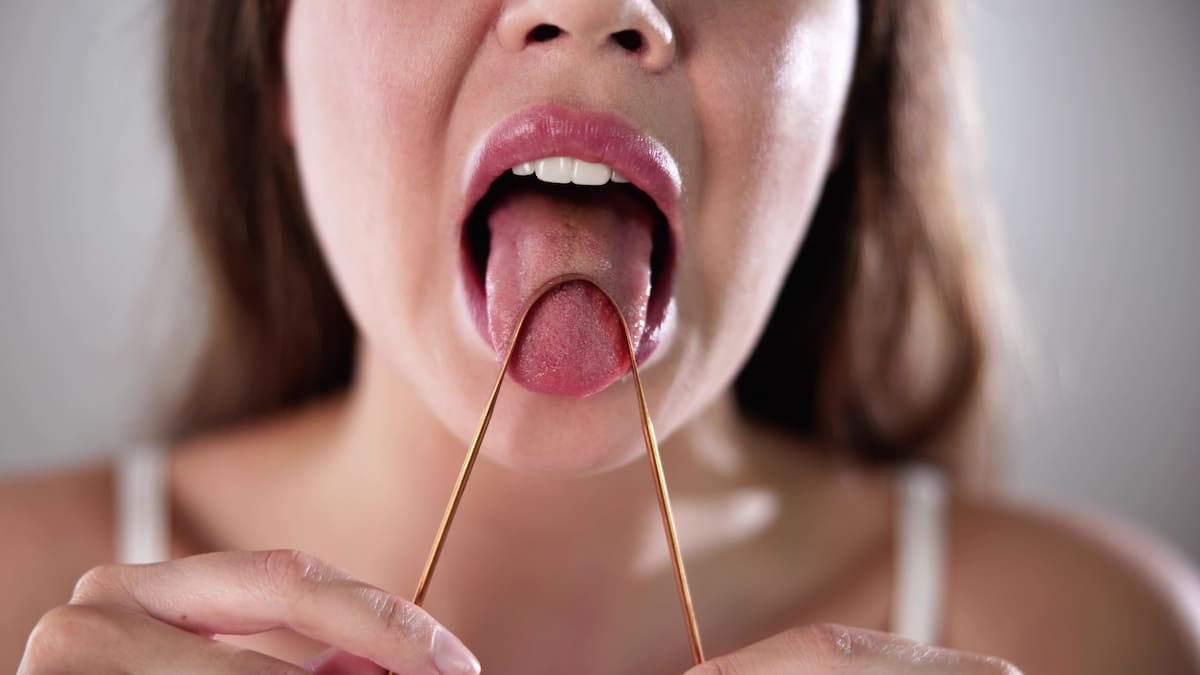Try brushing your tongue with a toothbrush every time you brush your teeth or using a dedicated tongue scraper twice a day. Clinical trials, though limited, have shown scraping and brushing the tongue can both temporarily reduce odour-causing bacteria. Whatever you choose, be gentle and make sure you’re also reaching the back-most third of your tongue.
Should I try tongue scraping?
Tongue scrapers, made of plastic or metal, are thought to help refresh the palate and can be, admittedly, satisfying to use when you see how thick a biofilm they remove.
The practice isn’t recommended by the American Dental Association as an essential part of your at-home oral care routine. But tongue scraping has a long history in ayurvedic medicine, a traditional South Asian healing system, and there’s little risk in trying it and seeing if it works for you.
To use a tongue scraper, simply drag the curved end back to front along the surface once or twice. Go as far back as you can without gagging. (Because of its flatter profile, a tongue scraper may be more tolerable than a toothbrush in this regard.) Make sure to rinse the scraper clean afterwards.
Does mouthwash stop bad breath?
There is some data that mouthwashes can help with bad breath, especially those containing chlorhexidine or a combination of cetylpyridinium and zinc, but these have also been linked to tooth discolouration.
Research is still emerging on how mouthwashes may negatively impact the oral microbiome – the collection of microorganisms living inside your mouth. For instance, mouthwashes have been linked to reductions in oral bacteria that produce a blood-pressure-lowering compound, and a 2020 study found those who used mouthwash twice a day had a higher incidence of hypertension, even after controlling for other variables like smoking, alcohol use and physical activity. Researchers are interested in how our oral microbiome influences other aspects of our health, but it’s going to be years before we have all the data we need.
What foods lead to bad breath?
The sulphur in your breath is a function of the food you eat, how that food was processed and how your oral bacteria react to it. For example, roasting boosts volatile sulphur compounds and so do preservatives, as is often seen in ultra-processed foods.
Because of these factors, it can be hard to pinpoint exactly which food is an individual’s biggest problem. But, short of conducting a systematic trial judged by a loyal friend, here are common offenders:
- Plants of the allium genus including garlic, onions, leeks and chives.
- Certain, often tropical, fruits: strawberries, kiwifruit, pineapples, grapefruit, watermelon and the infamous durian.
- Roasted meat, chicken, seafood – and sadly, yes – coffee.
- Dairy products and cheeses – even parmesan and cheddar.
- Horseradish.
In addition to these foods, smoking and alcohol contribute to foul breath.
Though breath mints can potentially temporarily mask a bad odour, they aren’t doing much to mitigate the underlying problem.

Can bad breath be a sign of a medical issue?
As many as one in four people who are convinced they have bad breath do not objectively have bad breath when measured by a clinician. Drawing a line between innocuous-smelling breath and foul-smelling breath, sometimes called halitosis, can be subjective in everyday life.
Still, the kind of bad breath that persists during the day despite all reasonable efforts could indicate something else is going on. In my clinic, I start by looking for reasons patients may have a chronic dry mouth, such as from a medical condition like Sjogren’s syndrome or because of medication side effects.
Other reasons may have nothing to do with the mouth at all and could be due to an abnormality in your gastrointestinal tract. When in doubt, discuss with your dentist, and if the issue seems outside the mouth, talk to your physician. I know it’s embarrassing, but we’re here to help.

What I want my patients to know
Waking up with foul breath is, tragically, perfectly normal. This happens because production of saliva, which serves to cleanse our palates and keep oral bacterial growth at bay, plummets at night. A dry mouth is also why hotter atmospheres or sleeping with your mouth open can aggravate the problem. Bad breath is worse when we’re suffering from a respiratory infection due to all the nasal and sinus secretions entering our mouths.
Trisha Pasricha is a physician and instructor of medicine at Harvard Medical School.






